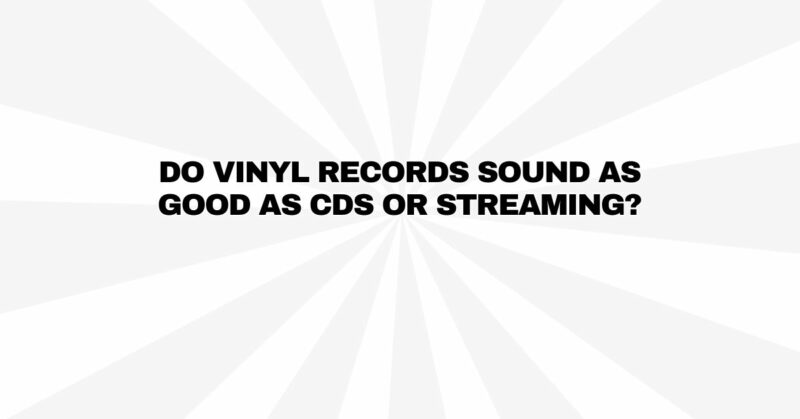The ongoing debate over whether vinyl records sound as good as CDs or streaming services has captivated audiophiles and music enthusiasts for years. This discussion delves into the nuanced world of audio quality, preferences, and the unique characteristics of each format. To determine if vinyl records match or surpass the sound quality of CDs or streaming, we’ll explore the factors influencing this debate.
Understanding the Formats:
Before diving into the debate, it’s essential to understand the key characteristics of vinyl records, CDs (compact discs), and streaming audio.
- Vinyl Records: Vinyl records store music in an analog format. Sound is physically etched into grooves on the vinyl’s surface. When played on a turntable, a stylus traces these grooves, translating them into an electrical signal that’s amplified and sent to speakers.
- CDs: Compact discs use digital technology. Music is stored as binary code in a series of pits and lands on the disc’s surface. Laser light is used to read the code, converting it into a digital signal, which is then converted back into an analog signal for playback.
- Streaming Audio: Streaming services like Spotify and Apple Music deliver music as compressed digital files over the internet. These files are decoded by your device and converted into an analog signal for playback.
Factors Influencing Audio Quality:
Several factors influence the perceived audio quality of each format:
- Bit Depth and Sampling Rate: Digital formats (CDs and streaming) offer high bit depths and sampling rates, enabling precise representation of audio. This results in clarity, dynamic range, and detail.
- Analog Warmth: Vinyl records are celebrated for their analog warmth. Analog formats capture subtle variations in sound and imperfections that some listeners find more emotionally resonant.
- Playback Equipment: The quality of turntables, CD players, speakers, and headphones significantly impacts audio quality. High-end equipment can reveal subtleties in sound.
- Listening Environment: The room’s acoustics, speaker placement, and background noise can affect how audio is perceived.
The Vinyl Experience:
Advocates of vinyl records often highlight several factors contributing to their unique appeal:
- Analog Warmth: Vinyl records are revered for their warmth and character, which stems from analog playback. Enthusiasts argue that this warmth adds depth and emotion to the music.
- Tactile Engagement: Playing vinyl records involves a tactile, hands-on experience, from selecting a record to carefully placing the needle on the groove. This physical interaction enhances the connection to the music.
- Album Art and Packaging: Vinyl records often feature visually striking album art and packaging, adding to the overall experience and collectibility.
- Nostalgia and Collectibility: Vinyl records evoke nostalgia and a sense of connection to the history of music. Collectors appreciate the hunt for rare and vintage releases.
The Digital Advantage:
Digital formats, such as CDs and streaming, offer advantages of their own:
- Clarity and Precision: Digital audio provides clean, precise, and consistent sound reproduction. High-resolution audio can deliver exceptional detail and dynamic range.
- Consistency and Durability: Digital formats are not susceptible to wear and tear like vinyl. They offer consistent sound quality with each play and are resistant to physical damage.
- Convenience and Portability: Streaming services provide instant access to vast music libraries, accessible on multiple devices. This convenience suits modern, on-the-go lifestyles.
Subjective Listening Experience:
Ultimately, audio quality perception is highly subjective. Personal preferences, equipment quality, and listening conditions play significant roles. Some listeners favor the analog warmth of vinyl, while others prioritize the precision of digital audio. The specific genre of music being enjoyed can also influence preferences.
Conclusion:
The debate over whether vinyl records sound as good as CDs or streaming is nuanced and subjective. Each format offers a unique listening experience, with its own set of strengths and characteristics. Vinyl records are celebrated for their analog warmth and tactile engagement, while digital formats offer clarity, precision, and convenience.
The choice between vinyl, CDs, or streaming ultimately comes down to individual preferences, priorities, and the emotional connection one seeks from their music. Whether you’re drawn to the nostalgic charm of vinyl, the pristine quality of CDs, or the convenience of streaming, the diverse world of music formats ensures that there is something for everyone to enjoy.


